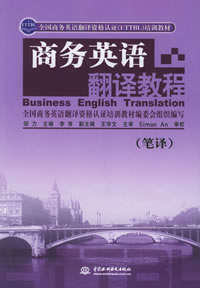书面翻译与口译培训核心步骤
作者:古龙 2009-07-04




语际翻译公司 转载请注明https://www.scientrans.com
∗本栏目部分文章内容来自互联网,部分已经过本站编辑和整理,如有版权事宜请联系Email/MSN jesczhao@hotmail.com
• Todo eso le pasó por ser martes 13. El martes 13: supuesto día de mala suerte (bad luck day in Spanish with its counterpart Friday 13 in English -> . . . Friday 13
• Biscocho, pastel, cake, torta, tarta -> A few variants of cake in Spanish countries
• Espejuelos, gafas, lentes -> Some of the variants in Spanish for eyeglasses
• Autobús, ómnibus, guagua, bus, camión -> Some equivalent variants of bus
• Vulgarities/profanities: Exercises including such terms always appear marked with an asterisk to warn the reader/trainee. They start appearing in the Intermediate section and are usually mingled with regular vocabulary. Some reasons for including these speech realizations are the following: Although this type of terminology may not be the rule in T-I work, it is certainly not the exception either. They happen more often than not in court and court-related proceedings such as trials, pre-trial interviews, jail interviews, psych-evaluations, depositions and so forth.
Examples:
• ¡Coño!, ¡carajo! -> Damn it! (From a 911 call)
• Ese pinche ladrón. . . (From a 911 call)
• ¿Esa es la mierda que me va a dar el tipo éste? -> That's the piece of shit this guy is gonna give me?! (At sentencing, Miami XI District Court)
It is pertinent to mention here that, on more than one occasion, this author was called to "urgently" replace an interpreter who simply "froze" when the defendant she was interpreting for in court suddenly started to use the kind of language illustrated above, at its worst. In those instances, the "freaked-out" interpreter had had little court experience. In a couple of cases, the interpreter had only served as one for religious conferences and events. They were good, fluent linguists in both English and Spanish, but had never handled this kind of vocabulary in front of an audience!
• Business, Ads and Related Texts: Where the translator-interpreter becomes aware of different approaches to "sell" as practiced by companies and enterprises within totally different linguistic frameworks.
Examples:
o These items are on a permanent sale -> Estos artículos son una/están en ganga permanente / siempre con el precio rebajado (Mall stores).
o Our new restaurant will be quick-casual -> de/con servicio rápido e informal (New West Coast-style restaurant ad).
o No pets, no smoking, no late-night parties... -> No se permite fumar, no se permiten mascotas ni fiestas tarde (en la noche) (Rooms/Apartments for Rent in the Classified section, Mid West newspaper).
• Functional and Comparative Grammatical and Lexical Phenomena: Where the translator-interpreter has to constantly "travel" from one given structure or approach to reality in the Source Language into other structures or approaches in the Target Language through transpositions, modulations, adaptations, compensations and other techniques. This type of activity enables students to become aware that the same reality is often approached quite differently in different languages.
Examples:
o Passive Voice: Alterations are made here -> Se hacen arreglos de/se arregla ropa aquí
o Uses of the Gerund: Smoking is dangerous -> (el) fumar es peligroso
o Noun Adjuncts: washer, dryer hookup... -> conexión para lavadora y secadora...
o . . . mirando el ir y venir de la gente -> . . . watching people come and go
o I love black and white films -> Me encantan las películas en blanco y negro
o El niño está sucio de pies a cabeza -> The kid/boy is dirty from head to toe
&nbs
- 评论
- seme:文章内容文章内容文章内容文章内容文章内容文章内容文章内容文章内容文章内容 章内容文章内容文章内容文章内容文章内容
- seme:文章内容文章内容文章内容文章内容文章内容文章内容文章内容文章内容文章内容 章内容文章内容文章内容文章内容文章内容

- 日常生活中常用的英语五星级句子
2009-7-11 23:00:38 - 熟练地运用英语的一个重要方面就是学习并掌握英语本族者常用的生动、的活泼的习语。 1. After you.你先请。这是一句很常用的客套话,在进/出门,上车得场合你都可以表现一下。好象现在女士不愿意你这么做,特别是那些女权主义者,我还记得这么一段话:一个女士对...
- 英语中各种数字的读法
2009-7-11 22:59:44 - (1)年号的读法: 1979←→nineteen seventy-nine or nineteen hundred(and) seventy-nine; (2)电话号码、货币的读法: 1023←→one o two three;1227←→one dou...
- 第四届IEEE生物信息与生…
2009-6-30 19:42:01 - 基本信息 主办单位: 四川大学,IEEE生物医学工程协会(EMBS) 承办单位 开始日期 2010/06/18 结束日期 截稿日期 2009/1...
- 第九届全国光电技术学术…
2009-6-30 19:35:58 - 基本信息主办单位: 中国宇航学会光电技术专业委员会承办单位 开始日期 2009/11/01结束日期 截稿日期 2009...
















